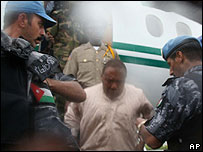
The Walls Have Closed In On Charles G. Taylor
By Abdoulaye W. Dukulé
The Perspective
Atlanta, Georgia
March 30, 2006
 |
|
Courtesy of AP
|
There is something schizophrenic about quoting oneself but the urge is irresistible when history plays itself under our very eyes, not in the course of centuries or even decades, but just a mere few years.
These lines were written on April 29, 2002, when the thugs of Charles Taylor, led by Paul Mulbah, then police director, arrested Tiawan Gongloe and threw him in a cell with security agents who beat him up, tortured him and almost killed him. What followed was even more heartless. The police officers, looking at Tiawan in a state of total inanity, asked that he get “upstairs” to answer questions before he could be released. His friend and legal partner, Beyan Howard had to carry him on his back to climb the steps to the interrogation room.
Tiawan’s crime was to have delivered a speech in Conakry where he spoke of the importance of the respect of human rights in the Mano River Union Basin as the first step to democracy. One of Mr. Taylor’s “spies” who was attending the conference came back to Monrovia and told the president that Tiawan had insulted him and spoken against his policies. Tiawan was taken into custody and only survived thanks to international pressure. His body was badly damaged and he spent many days in hospitals in Monrovia and in Accra before finding his way back to the US for more care. He returned to Monrovia, after helping the campaign of Mrs. Ellen Johnson Sirleaf and is now serving as Solicitor General.
As fate would have it, yesterday, March 29, 2006, the day of a rare and total solar eclipse that many around the world would remember, Tiawan was at the airport, welcoming back Charles G. Taylor, in handcuff and reading him his rights before turning him over to the United Nations security personal. Taylor was whisked off into a helicopter towards Freetown, Sierra Leone where a special war crimes tribunal awaits him.
So, from former president in exile, Taylor has become a fugitive, having shed away the last sympathizers he may have had. The few in Nigeria who tried to defend his “honor” as a former head of state, have reached the same conclusion as former Senegalese Chief Of Army Staff, General Mansour Seck, who in 1992, after spending just 20 minutes with Taylor in Gbarnga, told Interim President Dr. Sawyer: “this is man is a petty bandit with grand means and ambitions. Either you get rid of him or he will kill anyone who stands in his way to power. You are wasting you time in negotiating with him.”
By trying to abscond, Taylor put himself back where he was 20 years ago, a smart fast talking hoodlum, skimming to get his way. Had he stayed in Calabar, accepted his fate as a warrior or waited for whatever fate his former “peers” devised for him, he could have still claimed some respectability. A head of state does not run away in disguise. But the question Liberians must ask now is whether Taylor ever amounted to being a president. The emperor was always naked, unbeknown to himself and to his entourage.
Taylor’s spiritual advisor said that he did not want to face the tribunal in Freetown but would rather go to The Hague. This is ironic coming from a man who spent his “presidency” shouting about African dignity and Africans controlling their own destiny. Of course, if Africa’s fate were to be left in the hands of people like him, who would ever want to face a judge or a court of law on the continent.
Taylor said two years ago when he left that “God willing, I will be back.” He did return, in shackles, like a common criminal. And the new Solicitor General of the Republic of Liberia, Tiawan Gongloe, was there to read him his rights.
How did Tiawan feel about this all? The human rights lawyer (within him) probably asked Charles Taylor if he had been mistreated, if he were hungry, thirsty or if the handcuffs were too tight…
A snapshot of the meeting between Tiawan and Taylor, on the tarmac of Roberstfields International Airport could have many interpretations or be simply the best proof that life goes in circle. What goes around is bound to surface again. Indeed, Taylor came back, not as a king or a president, but as a fugitive, running away from the law. Some things never change.